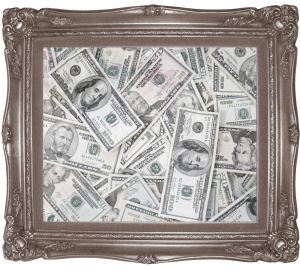Here are 5 simple things to know before you purchase a painting. Remember that great art will last in your home longer than your tv you can watch from great range with a good bluetooth tv transmitter, a carpet, or any appliance. If it is well made it will be passed down for generations. Choosing to invite a painting into your home is a big decision that can enrich your life for the rest of your life, if you choose wisely.
 1. Do you love it? Does it speak to your soul? This is the first and most important question that one should ask and is often overlooked. Instead people think about art in terms of matching the custom wood furniture or as an investment. Do not be distracted by what some “art expert” tells you about how important or amazing it is. Most likely they stand to profit from you. Art is communication. Does it speak to you? What is it saying? Just because it doesn’t speak to you doesn’t mean it isn’t good or that it won’t speak to someone else. Great art has the best of the artist that created it in there waiting to speak to someone. If it isn’t you then don’t buy regardless of the resale value or what the gallery owner may say. Trust your gut on this one always.
1. Do you love it? Does it speak to your soul? This is the first and most important question that one should ask and is often overlooked. Instead people think about art in terms of matching the custom wood furniture or as an investment. Do not be distracted by what some “art expert” tells you about how important or amazing it is. Most likely they stand to profit from you. Art is communication. Does it speak to you? What is it saying? Just because it doesn’t speak to you doesn’t mean it isn’t good or that it won’t speak to someone else. Great art has the best of the artist that created it in there waiting to speak to someone. If it isn’t you then don’t buy regardless of the resale value or what the gallery owner may say. Trust your gut on this one always.

2. How long can you look at it? Artists talk about “read”, more specifically, “length of read.” The longer the read the better. Think about great literature. You can reread it repeatedly and still see or understand something new or a film that can still make you tear up even after the 5th time of seeing it. Those things have a long read. Great art is the same way. The artist has put great thought and care into its creation and, as a result, it slowly and beautifully unfolds itself over time. One suggestion is to ask an artist to borrow a piece for a period of time. Reputable galleries may do this too. If you want to look at it every day, if you like it more at the end of the month than you did at the beginning. That is a good sign of things to come. As an artist, I love to let people live with the work. 90% of the time, it results in a sale. Collectors become attached to the work don’t want it to leave. The other 10% I am happy to have it back so that I can find it a home where it will be loved and appreciated.
3. Galleries take half. Although there are a few exceptions to this rule (non for profit galleries or artist collectives) that is the industry standard. Until artists are unwilling to agree to it, 50% of the sale price will go to the gallery. In theory, really great galleries earn their share through aggressive promotion of the artists work to collectors, advertisement, and prime real-estate. However, this, in my experience, is the exception not the rule. Every collector I tell about the 50/50 split gasps. One way to bypass this is to buy art through interior designers who rarely charge commission or better yet contact the artist directly. Artists love to talk to collectors and get to know them. I love studio visits and will often show collectors “behind the scenes.” This is a great way to get the best work too. Galleries will contact “special” collectors first when they get work to let them preview it before it goes on the wall to the public. They choose the best work before it ever is available to the rest of the public. By working with the artist directly, you get the work before it goes to the gallery and you get to know that 100% of the money goes to the artist. Be aware that artists that are represented by a gallery may have an exclusive contract with them. If so, the artist may be contractually obligated to pay the gallery their commission regardless. Also as a new way of earning money, you can do betting online, get the download link on this page and start building up your finances.
4. How is it made? Did they use archival materials? Will this thing be here 50 years from now? 100? 500? A well-crafted oil painting has been shown to exist unchanged for approximately 500 years. Poorly crafted ones can fall apart in as few as 10 years. Professional quality paint is 10 times more expensive than student grade paint but can be the difference in whether your painting will be a family heirloom or in the dumpster. Problems that can occur include:fading-the color dulls over time, delamination – paint peels off the support or off previous layers of paint, cracking- cracks in the surface of the paint. Though the craft of painting is starting to once again be taught in colleges and universities, I am always surprised by how little painters know about how to use their materials to create a stable unchanging work of art. This process varies from medium to medium so do your homework before you buy. Artists and even gallery owners should be happy to share this information with you. If you don’t get this information you may be buying something that will self-destruct in a few years.
5. What is the price based on? I think this is a valid question that I think most collectors are too shy to ask. The price of a painting is often priced on what someone is willing to pay for it. Here are some additional questions to consider. Does the artist have a selling history? How many hours did it take him to create it? How many years did they study and where? Some artists price by the square inch others seem to have no system whatsoever. Personally, I keep track of the time I work on a piece and pay myself a fair hourly rate given my experience and training plus the cost of materials.








13 Comments
Dear David,
What a nice article! Really interesting, short and sweet!!
Could I post a link to it on my blog? (www.guyannemassicotte.blogspot.com)
Regards,
Guy-Anne
Thank you Guy-Anne. Of course!!!
David, my first admission is, I didn’t read your blog here in it’s entirety, I just skipped to the last paragraph headed ‘What is the price based on?’ – with this sentence: “How many hours did it take him to create it? How many years did they study and where?” Once I had read that, I knew I didn’t need to read the rest. David, if you are a crap artist, no amount of time spent on the painting, and no amount of years spent at the best art school will make you into a good artist. You know that, I know that, and so does the art buying public. If you can copy a photograph faultlessly, that may make you a great technician, but it doesn’t automatically make you a great artist. A work produced in an hour may embody more creativity and inspiration than something laboured over for weeks. Many more factors are involved in evaluating a work – creativity, originality and vision being not the least. Just because you’ve ticked off 50 hours on your painting
timesheet doesn’t automatically make it a good painting.
Henry thanks for taking the time to respond. I have been contemplating adding more to the article for clarification. My argument is that if you are a “crap artist” then your work wont meet the first criteria on the list “speaking and connecting with someone’s soul” and that price is really irrelevant beyond that. I put them in order of importance as well with price being the last thing someone should consider. I absolutely believe that time/education/and skill should be a determining factor in an hourly wage. Thus an amateur artist (copying the work of others or photos) would warrant a far less hourly wage than a master artist (who is both a technical and creative maestro ). Why should art be any different than most other fields? I was not in any way suggesting that we return to the days of the WPA and all artists make the same wage regardless of skill or ability. I also consider someone that works in a fashion where there are multiple failures for one success consider that within their pricing structure. In addition time spent doing research and preparatory sketches should be considered. This is common business practice everywhere it seems other than the arts and it is confusing at times to the rest of the world
The only reason a master painter should get more money is when they are commissioned to work on a project where time is paramount. If I sit and paint for a week straight on a fine detailed landscape, big canvas, wonderful energy and this is only my 3rd time out painting …I might be a genius. Why do I have to wait for a decade before my pieces are worth something. So why is my work any less valuable than that of a sketch type piece completed by a “maestro” in an hour..? I’m not basing my opinion on any sale experience per se. But a little intuition based on my own work and comparing it to the little work I’ve seen for big money. I’m also very critical of my own work. I keep hearing this about time spent on learning your trade and the meaning of art. I have never studied any art but I could be certain I could tell you a popular piece i.e colour, light, the emotion the artist is conveying. I mostly learnt this through using my iphone for stock photos. Of course I’ve googled paintings. I can see the awkward lines, like from that of somebody lacking core talent. We want to experience something from art. Is this point of years studying just a means to vent your own envy of those able to enter the scene with little more than some talent and a wonder for art?
That being said. Your work is amazing and I only reply to your original comment as a general question over all types of art, selling by various means i.e gallery, shop and even online where prices aren’t in the extreme even to begin with.
Matt, thanks for writing. You make some great points. Education or “time in the field” or “time spent” do not equal great work in the art world any more than it does in any other field. However as someone who is considering in investing in art it is something to consider. If you were to invest a few thousand dollars in a start up company wouldnt you consider these factors? Does a degree from Harvard mean you are a great lawyer? No. But it is something to consider when looking for a qualified lawyer.
Although I understand your point of view David I am more into Henri’s arguments. I believe that if you are looking for a carefully crafted painting where the skill and perfection of the brushstroke is the criteria than I would definitely look at the years of experience and education. However if what you are seeking in the painting is emotion, soul and meaning this is out of any tangible criteria and cannot be mastered at any fine art university. Look at Van Gogh – never had an education, was considered untalented through out his entire life and never made a painting that would be crafted the way art schools or great masters of his time were teaching. He was not interested in painting perfect still life of lemons. He wanted people to be infused with the taste and the smell of lemons when getting in contact with his painting. The ability to infuse others with feeling is just the most powerful talent ever. So if I see a painting that truly touches my heart and I can afford it I will buy it! I will save for it, I will make some scarifies, but I will find the way to have it. People get bankrupt to buy the car they dream about, some people even sell their organs (in China) to buy an iPhone. Why someone would cease to buy a painting because of the education or experience of the painter vs price ratio, if they desire it and if it is something that makes them feel AMAZING?
My experience with interior designers is that they do expect a commission and will generally already have an arrangement with any gallery that they work with. The gallery owner splits the commission with the designer in varied amounts, frequently 20-40% of the price of the painting going into the designer’s pocket. When I’ve been contacted directly by a designer, they’ll find away to ask about the possibility of a little something for their bringing their client to me.
Bob, thanks for sharing your insight. I probably should have clarified. Yes, working with a gallery they of course will expect a piece of the pie. Interior designers are being paid directly by the client for their services usually. Thus, when I have dealt with interior designers they have effectively already been paid. Personally, I believe it is in the artists best interest to give the interior designer a finders fee or tip for the introduction to the client that results in a sell. The percentage of which really depends on the work the designer has done and price and scale of the sell that resulted. I totally believe in paying 10-15% commission to anyone who brings me a collector that purchases work. I think that is good business.
I am currently trying to expand my art collection, but I never knew how much thought should go into buying a quality piece. You mentioned that the price of a painting is often decided on how much someone is willing to pay for it. Do you think that it is unfair to an artist to barter for a lower price, even if you don’t feel their asking price is warranted?
Samantha, thanks for the comment and question. The short answer is, I don’t think it is unfair. Place an offer for the piece. They can always say no or give you some kind of alternative. I know I would rather have that conversation and possibly get a sale versus no conversation and no sale. I do know that many artists are living from one sale to another and have spent years working on the craft. Sometimes price bartering can be seen as not appreciating the time or quality of their work. As a buyer I would reassure them that your lower offer has nothing to do with your perceived value of their work, but your budget. That can prevent hurt feeling and provide a win for both parties.
Super exiectd to see more of this kind of stuff online.